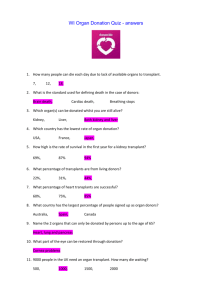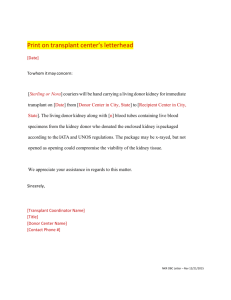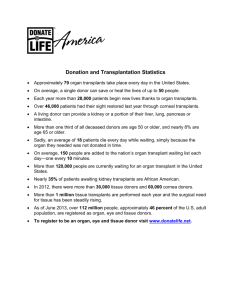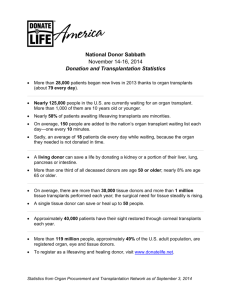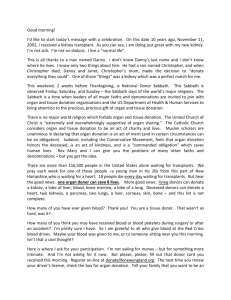Kaitie Wallace Interviews Kidney Transplant Recipient Liz McKinney
advertisement
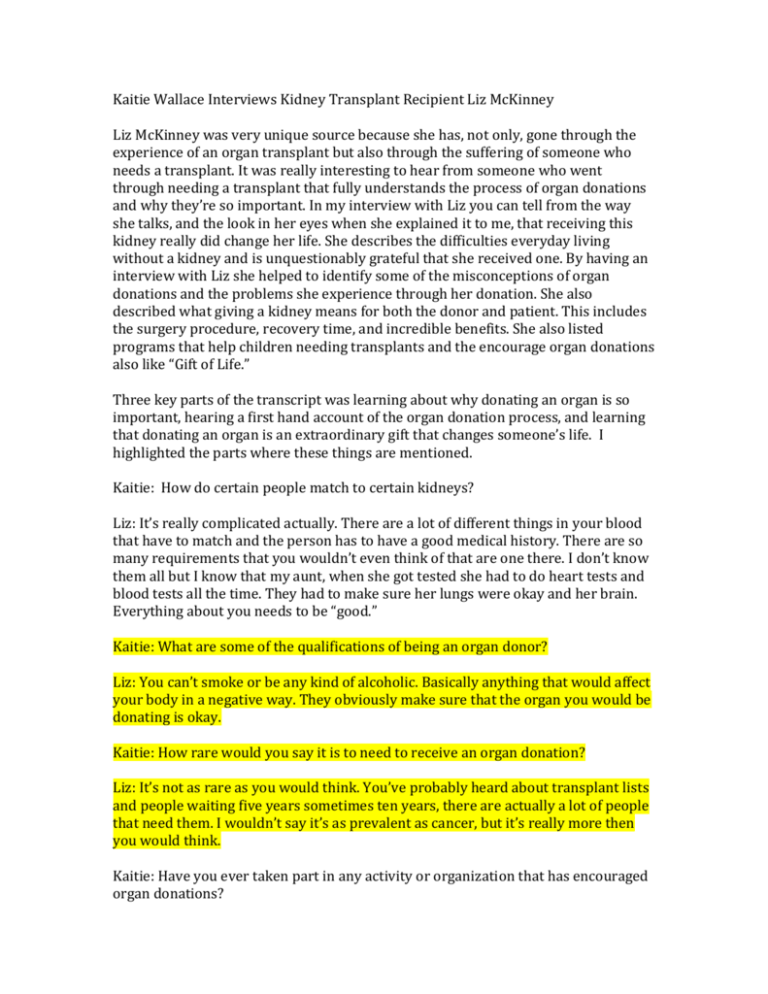
Kaitie Wallace Interviews Kidney Transplant Recipient Liz McKinney Liz McKinney was very unique source because she has, not only, gone through the experience of an organ transplant but also through the suffering of someone who needs a transplant. It was really interesting to hear from someone who went through needing a transplant that fully understands the process of organ donations and why they’re so important. In my interview with Liz you can tell from the way she talks, and the look in her eyes when she explained it to me, that receiving this kidney really did change her life. She describes the difficulties everyday living without a kidney and is unquestionably grateful that she received one. By having an interview with Liz she helped to identify some of the misconceptions of organ donations and the problems she experience through her donation. She also described what giving a kidney means for both the donor and patient. This includes the surgery procedure, recovery time, and incredible benefits. She also listed programs that help children needing transplants and the encourage organ donations also like “Gift of Life.” Three key parts of the transcript was learning about why donating an organ is so important, hearing a first hand account of the organ donation process, and learning that donating an organ is an extraordinary gift that changes someone’s life. I highlighted the parts where these things are mentioned. Kaitie: How do certain people match to certain kidneys? Liz: It’s really complicated actually. There are a lot of different things in your blood that have to match and the person has to have a good medical history. There are so many requirements that you wouldn’t even think of that are one there. I don’t know them all but I know that my aunt, when she got tested she had to do heart tests and blood tests all the time. They had to make sure her lungs were okay and her brain. Everything about you needs to be “good.” Kaitie: What are some of the qualifications of being an organ donor? Liz: You can’t smoke or be any kind of alcoholic. Basically anything that would affect your body in a negative way. They obviously make sure that the organ you would be donating is okay. Kaitie: How rare would you say it is to need to receive an organ donation? Liz: It’s not as rare as you would think. You’ve probably heard about transplant lists and people waiting five years sometimes ten years, there are actually a lot of people that need them. I wouldn’t say it’s as prevalent as cancer, but it’s really more then you would think. Kaitie: Have you ever taken part in any activity or organization that has encouraged organ donations? Liz: In Kansas City there’s a company called Gift of Life and they fundraise and promote organ donation and advocate for that. I took part in a mentor program where I met with a girl who needed a kidney transplant and answered her questions. As someone who’s been through it, sometimes nobody understands so it’s nice to talk to someone who has been through the same thing. Kaitie: How does having a kidney transplant affect your daily life? Liz: Well for a transplant, not that much. I have to drink a ton of water. I have to drink three liters of water everyday. I have to take medicine twice a day, that’s probably the biggest thing. The medicine is timed so you have to take it at a specific time twice a day everyday. You can’t forget because those are your immune suppressants. If you forget those, your body will figure out that the kidney you got is not your kidney and your immune system will start to attack the kidney. Other than that, now it’s pretty normal. Kaitie: How does organ donation affect the donor’s daily life? Liz: Well she’s fine now. She was out of work for a while because it’s harder for the donor to recover than it is for the person receiving the transplant. She’s back to normal life she doesn’t have to take medicine or anything. Everything is normal for her. Kaitie: If your aunt hadn’t donated her kidney to you, how long do you think it would have taken you to get one? Liz: Oh gosh, I would probably still be waiting for one right now. It’s indefinite, like I have no idea. I would still be on the list, on dialysis, waiting for a kidney. Kaitie: Do you think something needs to be done to increase organ donations and the number of people who choose to be an organ donor? Liz: I think something definitely needs to be done to increase awareness. I think people. I think people need to know it’s not as scary as it sound, and the chances of you needing a kidney (because you only need one) or part of your liver (parts of your liver can grow) again are slim. Yeah, you feel crappy for a little while but then you get to help out someone else in a HUGE way, basically change their life. Kaitie: After receiving an organ donation, are you more likely to sign up to be an organ donor when you die? Liz: Yeah, well I would. After going through the process, yes, I would definitely do that. But, again after having all these health issues it probably wouldn’t be a good idea for me to do that because I don’t think someone would want any part of me that I have to give. But anyone who is healthy should. I mean if you’re dead, you might as well help someone else live. I’ve heard of families being against that but you’re helping out someone’s life in place of a death. Kaitie: What would you say to someone to encourage them to sign up to be an organ donor? Liz: What have you got to lose? Honestly, especially on your license. You’re going to be dead if they’re using your organs so might as well go towards a good cause instead of just being put in the ground to rot, basically. I mean it’s a good thing; you’re helping someone else out and helping their life out. My transplant changed my life and it’s a huge thing. I would feel good about donating; I would feel like a good person, if I did that. Kaitie: How has going through the transplant and hospital experience affected your future career? Liz: Well, it’s what made me decide to be a nurse. I honestly probably wouldn’t have done anything in health care if this hasn’t happened to me. But, just the way that nurses and doctors helped me through it and basically changed my life it just makes you want to give back and do the same thing for someone else.
